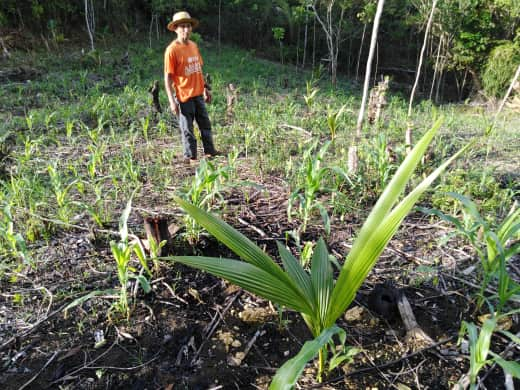
For all the years that Boholanos have been wantonly cutting coconut trees for lumber, the Philippine Coconut Authority (PCA) is now averaging the replanting of 314 coconut seedlings a day under their Participatory Coconut Planting Project (PCPP) in 2019.
PCA information Officer Jose Allan Cajilog bared this during the recent information sharing in time for the annual year-end evaluation and get together for the Association of United Development Information Officers in Bohol held at Vita Isola Resort in Panggangan Island, Loon last month.
Cajilog said that in 2019, through their PCPP, PCA has accounted for 114,658 coconut seedlings already germinating and are ready for transfer or are already transplanted in a one square meter pit, as to the registry the agency has for the year.
Through the PCPP, the government envisions to encourage and support coconut farmers and potential coconut farmers in planting and replanting coconut trees.
The government, through the PCA, intends to do this in a participatory strategy and gives incentives to participants who adopt the program guided by the PCA recommended Good Agricultural Practices (GAP).
Individual coconut farmers, be they landowners, owner-tiller, tenants or coconut farmers organizations and cooperatives, agrarian reform beneficiaries (ARBs), integrated social forestry (ISF) beneficiaries and indigenous peoples who can put up equity contributions like a planting area for coconuts of at least 0.5 hectares to a maximum of 10 hectares, can show proof of land ownership (if landowner or owner-tiller, ARBs and ISFBs) or landowner’s letter of consent (if tenant), can apply and register for the program, Cajilog explained.
Participants must also have a ready available source of good quality seed nuts and planting materials and must be willing to adopt PCA recommended technologies on seed nut nursery establishment and maintenance and transplanting and management of seedlings, PCA website added.
When it is participatory, program participants need to provide counterpart funds in the form of seed nuts and labor for nursery operations and maintenance and transplanting.
For this, PCA pays for every seed nut germinated and are about to be transferred, plus another batch for six months after the seeds have been transplanted, the total amount of incentives payable after five years after or when the palm reaches its productive stage.
Under the program, in 2019 alone, the PCA accounted for 114,658 coconut seedlings already set for transplanting or are already planted.
For this, the PCA has allocated almost P4.6 million in incentives for these Boholano coconut farmers who have registered under the program, according to Cajilog.
Aside from the PCPP, PCA also continues with its Coconut Seedlings Dispersal Program (CSDP) to coconut farmers where 14,600 dwarf coconut seedlings have been given within the year.
This, according to Cajilog costs the government some P1.2 million.
Despite the slump in the copra price in the world market, PCA is still hopeful that a recovery is nearing, local authorities assured.
In the meantime, the government is giving out 9,000 bags of organic fertilizer to coconut farmers even as the PCA is now urging farmers to intercrop coffee or cacao under the coconut trees, to increase incomes and cover the low prices of copra.
This year, Cajilog said coconut farmers received 20,800 coffee seedlings and some 200 bags of complete fertilizers for the intercrops. (rahc/PIA-7/Bohol)
